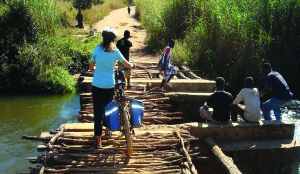By JOWIT SALUSEKI –
TO some people, the mere mention of Mwinilunga district brings images of pineapples and beans but few are aware of the existence of an infamous township called Kabanda.
Mwinilunga, which is one of the eight districts that make up North Western Province, is located more than 900 kilometres from Zambia’s capital city –Lusaka.
The town’s Central Business District (CBD) is made up of townships such as the low density area Kuma yard, Rental and Zesco townships, Chibolya and Kabanda.
Among the five residential areas that make up the town’s central region, is the Kabanda Township which is popular for all the wrong reasons.
As a matter of fact, a visit to Mwnilunga is said to be incomplete if one has not stepped a foot in this sprawling township which can be equated to Mansa’s Senama Township and Lusaka’s Chibolya.
The Kabanda Township is positioned on the south-end of the town as one depart the district heading to the newest district of Ikeleng’i on the Mwinilunga –Ikeleng’i-Jimbe road, connecting to neighbouring Angola.
The defunct Mwinilunga Pineapple Cannery which collapsed some years back was set up a less than a kilometre from this popular township that never goes to sleep at night.
The locals call it Kabanda yejima yejima (meaning Kabanda where everything is found) and in indeed all manner of misfits are under the belly of this famous ghetto which continues to attract people from all the ten chiefdoms of Mwinilunga, Ikeleng’i and beyond the borders.
Although, there are some few decently-built houses in the area, most of the dwellings are ramshackle structures made from either mud or are grass thatched from top to bottom.
Many are not even fit for human habitation coupled with lack of piped water since the place on has a few communal taps.
They cannot draw water from Lunga River which is just a stone throw away because it is crocodile infested.
The majority of residents use latrines which together with lack of piped water poses a health hazard for some households.
Hydro electricity is a luxury for many leaving only the option of solar energy or candles for lighting notwithstanding that Mwinilunga district have a thermal-generated power supply.
However, it is Kabanda Township, a place coined after a Chief Kabanda who was dethroned by white settlers in colonial days.
What social activities have given Kabanda its reputation? One would ask. It is usually prostitution and reckless beer drinking as locals bury their wretched existence in these social ills.
Illegal brewing of illicit brews goes unchecked by authorities with residents drinking 24 hours service.
The traditional leadership and the local council in Mwinilunga have tried, but in vain to curb the many illegal social activities in Kabanda whose population is about 10,000 according to the 2010 Central Statistics Office (CSO) estimates.
Prostitution on the other unfortunate side of the divide is so rife that it is a booming industry for both the young girls and ‘single’ women who befriend their clientele frequenting the area to imbibe themselves on the assorted menu of local brews.
Homemade brews such as Kachasu (a highly potent spirit) and Mbote (a wine -like beer made from honey) are popular in the area with imbibers preferring to sit in groups, while listening to the local Mwinilunga Radio which broadcasts on 91.5FM to the surrounding catchment area.
Alluding to the fact that Mwinilunga just like its sister district Kabombo has abundant honey, local brew such as Mbote beer is sold at a cheaper price of 50ngwee per 750 litres of a bottle.
With the district boasting of only a single bank -Finance Bank, some unscrupulous Government workers who come from far-flung places to draw their salaries sometimes squander all their monthly income when they befriend loose women who take them to their shabby dwellings.
Some civil servants such as who on several occasions abandon their respective rural places of work after visiting Mwinilunga town under the guise of trekking to draw their salaries but end up over staying in Kabanda township have paid heavy prices through dismissals after being reprimanded on several occasions by their superiors.
Teenage pregnancies in Kabanda Township just like Mwnilunga district as a whole has taken a toll due to juvenile leading to school-going age children getting pregnant.
Drug abuse is also rife in the township where one sees red-eyed dare-devil youths who move in small hordes openly smoking cannabis with impunity.
The locals allege that the police is incapable of weeding out the perpetrators of immorality that dogs the township for fear of being lynched by mobs of ruthless residents in the area.
Some unlucky visitors who venture into Kabanda and befriend depraved women in the township who own rooms in the settlement have on some occasions woken up to rude shocks upon realising that their clothes have been soaked in water by their hostesses in the hope of persuading them to stay for a few more days depending on their financial muscle to continue entertaining these women.
Within the township is the unplanned Nyasayanta market which comes alive every morning as youngster’s troop to poorly-ventilated video centres to watch the latest Nigerian movies.
Later it becomes a free for all to revellers patronising the illegal bars in an escapist pastime that is associated with all slums in Zambia.
The market which is like the heart and soul of Kabanda Township is renowned for its roadside business of selling merchandises such as small pieces of pork, chicken, beef and other delicacies which are sometimes sold on braii stands, with deafening music blaring from the speakers.
However, there is a sense of community when one of the residents dies. The others would readily help by fundraising for food and money for the bereaved family besides sleeping at the funeral house.It is this sense of humanity that should dispel harsh and ready judgement of residents because it shows that their predicament is largely social and has not completely erased core humanness of communal living.







